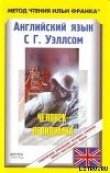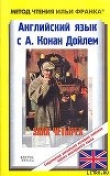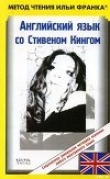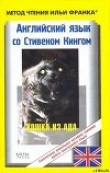
Текст книги "Английский язык с Шерлоком Холмсом. Собака Баскервилей (ASCII-IPA)"
Автор книги: Артур Конан Дойл
Соавторы: Илья Франк,Сергей Андреевский
Жанры:
Языкознание
,сообщить о нарушении
Текущая страница: 8 (всего у книги 38 страниц) [доступный отрывок для чтения: 14 страниц]
"Nail-scissors (ножницами для ногтей)," said Holmes. "You can see that it was a very short-bladed scissors (вы можете заметить, что это были ножницы с очень короткими лезвиями), since the cutter had to take two snips over 'keep away.' (поскольку тому, кто резал, пришлось сделать два надреза над словами «держитесь в стороне»)"
"That is so (это так). Someone, then, cut out the message with a pair of short-bladed scissors (выходит, кто-то вырезал сообщение парой ножниц с короткими лезвиями), pasted it with paste (приклеил клеем) –"
"Gum (камедью; gum – десна; камедь)," said Holmes.
"With gum on to the paper (камедью на бумагу). But I want to know (но я хочу знать) why the word 'moor' should have been written (почему слова «торфяных болот» написаны /от руки/)?"
"Because he could not find it in print (потому что он не нашел их в печатном виде). The other words were all simple (все другие слова были простыми) and might be found in any issue (и /их/ можно было найти в любом выпуске; to find), but 'moor' would be less common (но «торфяные болота» встречаются реже: «менее распространены»)."
follow ['fOl@u], scissors ['sIz@z], issue ['Isju:]
«So far as I can follow you, then, Mr. Holmes,» said Sir Henry Baskerville, «someone cut out this message with a scissors –»
"Nail-scissors," said Holmes. "You can see that it was a very short-bladed scissors, since the cutter had to take two snips over 'keep away.'"
"That is so. Someone, then, cut out the message with a pair of short-bladed scissors, pasted it with paste –"
"Gum," said Holmes.
"With gum on to the paper. But I want to know why the word 'moor' should have been written?"
"Because he could not find it in print. The other words were all simple and might be found in any issue, but 'moor' would be less common."
"Why, of course, that would explain it (ну, конечно, это все объясняет). Have you read anything else in this message, Mr. Holmes (/а/ еще что-нибудь вы разгадали в этом письме; to read – читать; разгадывать)?"
"There are one or two indications (есть две или три подсказки), and yet the utmost pains have been taken (хотя были предприняты все возможные усилия; pain – боль; старание) to remove all clues (/чтобы/ удалить все улики; clue – клубок; улика, ключ /к разгадке/). The address, you observe (адрес, /как/ можете видеть), is printed in rough characters (написан неровными печатными буквами). But the Times is a paper (но «Таймс» это газета) which is seldom found in any hands (которая редко находится в каких-либо /других/ руках) but those of the highly educated (кроме как в /руках человека/ высокообразованного). We may take it, therefore (поэтому мы можем предположить; to take it – принимать, допускать), that the letter was composed by an educated man (что письмо было составлено образованным человеком) who wished to pose as an uneducated one (который хочет выдать себя за необразованного; to pose – принимать позу; притвориться /кем-либо/), and his effort to conceal his own writing (и его попытка скрыть свой собственный почерк) suggests that that writing might be known (предполагает то, что этот почерк мог быть /вам/ известен), or come to be known, by you (или /случится так, что/ будет вам известен). Again, you will observe (/и/ опять же, вы заметите) that the words are not gummed on in an accurate line (что слова приклеены неаккуратно: «не в аккуратную линию»), but that some are much higher than others (и некоторые много выше других). 'Life,' for example («жизнь» например), is quite out of its proper place (совсем /выбилась за пределы/ надлежащего ей места). That may point to carelessness or it may point to agitation and hurry (это может указывать на небрежность или на волнение и спешку) upon the part of the cutter (автора письма: «того, кто вырезал»; /up/on the part of – от лица, от имени).
course [kO:s], clue [klu:], hurry ['hVrI]
«Why, of course, that would explain it. Have you read anything else in this message, Mr. Holmes?»
"There are one or two indications, and yet the utmost pains have been taken to remove all clues. The address, you observe, is printed in rough characters. But the Times is a paper which is seldom found in any hands but those of the highly educated. We may take it, therefore, that the letter was composed by an educated man who wished to pose as an uneducated one, and his effort to conceal his own writing suggests that that writing might be known, or come to be known, by you. Again, you will observe that the words are not gummed on in an accurate line, but that some are much higher than others. 'Life,' for example, is quite out of its proper place. That may point to carelessness or it may point to agitation and hurry upon the part of the cutter.
"On the whole I incline to the latter view (в целом, я склоняюсь к последнему; view – вид; мнение), since the matter was evidently important (поскольку вопрос был, несомненно, важным), and it is unlikely that the composer of such a letter would be careless (и вряд ли составитель письма был бы небрежен). If he were in a hurry (если он спешил; to be in a hurry – спешить, торопиться) it opens up the interesting question (то встает интересный вопрос; to open up – открывать возможности) why he should be in a hurry (почему он спешил), since any letter posted up to early morning (потому что любое письмо, посланное рано утром) would reach Sir Henry before he would leave his hotel (дошло бы до сэра Генри прежде, чем он покинул отель). Did the composer fear an interruption (боялся ли автор чьего-то вмешательства; interruption – перерыв; помеха) – and from whom (но чьего)?"
"We are coming now rather into the region of guess work (пожалуй, мы вступаем сейчас в область догадок)," said Dr. Mortimer.
"Say, rather, into the region (скажите лучше, в область) where we balance probabilities (где мы взвешиваем = рассматриваем возможности) and choose the most likely (и выбираем наиболее вероятную). It is the scientific use of the imagination (это научный /метод/ применения воображения), but we have always some material basis (но у нас всегда есть какая-то материальная основа) on which to start our speculations (с которой начинаются наши предположения). Now, you would call it a guess, no doubt (сейчас, без сомнения, вы назовете это догадкой), but I am almost certain (но я почти уверен) that this address has been written in an hotel (что этот адрес был написан в гостинице)."
view [vju:], region ['ri:dZ(@)n], guess [ges]
«On the whole I incline to the latter view, since the matter was evidently important, and it is unlikely that the composer of such a letter would be careless. If he were in a hurry it opens up the interesting question why he should be in a hurry, since any letter posted up to early morning would reach Sir Henry before he would leave his hotel. Did the composer fear an interruption – and from whom?»
"We are coming now rather into the region of guess work," said Dr. Mortimer.
"Say, rather, into the region where we balance probabilities and choose the most likely. It is the scientific use of the imagination, but we have always some material basis on which to start our speculations. Now, you would call it a guess, no doubt, but I am almost certain that this address has been written in an hotel."
"How in the world can you say that (как вам это может быть известно; world – мир, вселенная; in the world – выражение, служащее для эмоционального усиления)?"
"If you examine it carefully (если вы внимательно изучите его) you will see that both the pen and the ink (вы заметите, что и перо, и чернила; both – оба) have given the writer trouble (причиняли пишущему неудобства). The pen has spluttered twice in a single word (перо дважды в одном слове разбрызгивало /чернила/), and has run dry three times in a short address (и три раза высыхало /при написании/ короткого адреса; to run dry – высохнуть, пересохнуть), showing that there was very little ink in the bottle (показывая /тем самым/, что в чернильнице: «склянке» было очень мало чернил). Now, a private pen or ink-bottle (обычно: «сейчас» собственному перу или чернильнице; private – частный, личный; собственный) is seldom allowed to be in such a state (редко позволяют быть в таком состоянии), and the combination of the two must be quite rare (а чтобы и тому и другому: «комбинации из двух» – вообще крайне редко). But you know the hotel ink and the hotel pen (но вы знаете = вам знакомы гостиничные перья и чернильницы), where it is rare to get anything else (где редко получишь что-то другое). Yes, I have very little hesitation in saying (да, я почти без колебаний утверждаю; to say – говорить; заявлять) that could we examine the waste-paper baskets of the hotels round Charing Cross (что если бы мы могли обследовать мусорные корзины гостиниц вокруг Чаринг-Кросса) until we found the remains of the mutilated Times leader (до тех пор, пока не нашли бы останки изрезанной: «искалеченной» передовицы «Таймс») we could lay our hands straight upon the person (мы смогли бы указать: «положить руки на человека») who sent this singular message (который послал это необычайное письмо; to send; message – сообщение; письмо). Halloa! Halloa! What's this (эй, эй, что это; halloa /брит./ = hello – приветствие; восклицание, удивление)?"
splutter ['splVt@], rare ['rE@], mutilate ['mju:tIleIt]
«How in the world can you say that?»
"If you examine it carefully you will see that both the pen and the ink have given the writer trouble. The pen has spluttered twice in a single word, and has run dry three times in a short address, showing that there was very little ink in the bottle. Now, a private pen or ink-bottle is seldom allowed to be in such a state, and the combination of the two must be quite rare. But you know the hotel ink and the hotel pen, where it is rare to get anything else. Yes, I have very little hesitation in saying that could we examine the waste-paper baskets of the hotels round Charing Cross until we found the remains of the mutilated Times leader we could lay our hands straight upon the person who sent this singular message. Halloa! Halloa! What's this?"
He was carefully examining the foolscap (он внимательно разглядывал листок; foolscap – лист писчей бумаги /стандартного размера/), upon which the words were pasted (на котором были приклеены слова), holding it only an inch or two from his eyes (держа его всего лишь в паре дюймов от глаз).
"Well (ну что)?"
"Nothing," said he, throwing it down (ничего, – ответил он, бросая /листок на стол/). "It is a blank half-sheet of paper (это обычные пол-листа бумаги), without even a watermark upon it (даже без водяных знаков). I think we have drawn as much as we can from this curious letter (полагаю, мы выудили: «вытащили» из этого любопытного письма все, что возможно; to draw – тащить); and now, Sir Henry (а теперь, сэр Генри, /скажите/), has anything else of interest happened to you (еще что-нибудь интересное произошло с вами) since you have been in London (с тех пор, как вы приехали в Лондон)?"
"Why, no, Mr. Holmes. I think not (да вроде бы нет, мистер Холмс, думаю, нет)."
"You have not observed anyone follow or watch you (вы не замечали никого, кто шел бы или следил за вами)?"
"I seem to have walked (кажется, я попал) right into the thick of a dime novel (прямо в гущу /событий/ какого-то дешевого романа; dime – монета в 10 центов /в Америке и Канаде/)," said our visitor (сказал наш посетитель). "Why in thunder should anyone follow or watch me (какого черта кому-то преследовать меня или следить за мной)?"
"We are coming to that (мы /как раз/ к этому подходим). You have nothing else to report to us (у вас нет ничего больше, /чтобы/ сообщить нам) before we go into this matter (прежде чем мы /продолжим/ рассмотрение этого вопроса; to go into – войти; изучать, исследовать)?"
"Well, it depends upon (ну, это зависит от того) what you think worth reporting (что вы считаете стоящим упоминания)."
"I think anything out of the ordinary routine of life well worth reporting (я считаю все, что выходит /за рамки/ привычного жизненного уклада, стоящим упоминания; ordinary – обычный)."
curious ['kju@rI@s], London ['lVnd@n], routine [ru:'ti:n]
He was carefully examining the foolscap, upon which the words were pasted, holding it only an inch or two from his eyes.
"Well?"
"Nothing," said he, throwing it down. "It is a blank half-sheet of paper, without even a watermark upon it. I think we have drawn as much as we can from this curious letter; and now, Sir Henry, has anything else of interest happened to you since you have been in London?"
"Why, no, Mr. Holmes. I think not."
"You have not observed anyone follow or watch you?"
"I seem to have walked right into the thick of a dime novel," said our visitor. "Why in thunder should anyone follow or watch me?"
"We are coming to that. You have nothing else to report to us before we go into this matter?"
"Well, it depends upon what you think worth reporting."
"I think anything out of the ordinary routine of life well worth reporting."
Sir Henry smiled (сэр Генри улыбнулся).
"I don't know much of British life yet (я еще многого не знаю о жизни в Британии), for I have spent nearly all my time in the States and in Canada (поскольку провел почти всю свою жизнь: «все свое время» в Штатах и Канаде). But I hope that to lose one of your boots (но я надеюсь, что пропажа одного из ваших ботинков; to lose – терять, лишаться) is not part of the ordinary routine of life over here (не является здесь частью привычного жизненного уклада)."
"You have lost one of your boots (у вас пропал один ботинок)?"
"My dear sir," cried Dr. Mortimer (мой дорогой сэр, – воскликнул доктор Мортимер), "it is only mislaid (да он просто /где-то/ затерялся; to mislay – положить не на место; затерять). You will find it (вы /обязательно/ его найдете) when you return to the hotel (когда вернетесь в гостиницу). What is the use of troubling Mr. Holmes with trifles of this kind (какой смысл беспокоить мистера Холмса такого рода пустяками; use – употребление; польза, смысл)?"
"Well, he asked me for anything outside the ordinary routine (ну, он спросил меня о чем-нибудь неординарном)."
"Exactly," said Holmes (совершенно верно, – сказал Холмс), "however foolish the incident may seem (каким бы глупым происшествие не казалось). You have lost one of your boots, you say (у вас пропал ботинок, вы сказали)?"
"Well, mislaid it, anyhow (ну, он /где-то/ затерялся, не иначе; anyhow – так или иначе). I put them both outside my door last night (вчера вечером я выставил их оба за дверь), and there was only one in the morning (а утром там оказался только один). I could get no sense out of the chap (я не смог получить осмысленного ответа у парня; to get out – раскрывать /правду/; sense – чувство; смысл) who cleans them (который их чистит). The worst of it is (худшее из этого /то/) that I only bought the pair last night in the Strand (что я только накануне вечером купил эту пару на Стренде; to buy; Strand – одна из главных улиц в центральной части Лондона), and I have never had them on (и ни разу: «никогда» их не надевал)."
routine [ru:'ti:n], however [hau'ev@], pair [pE@]
Sir Henry smiled.
"I don't know much of British life yet, for I have spent nearly all my time in the States and in Canada. But I hope that to lose one of your boots is not part of the ordinary routine of life over here."
"You have lost one of your boots?"
"My dear sir," cried Dr. Mortimer, "it is only mislaid. You will find it when you return to the hotel. What is the use of troubling Mr. Holmes with trifles of this kind?"
"Well, he asked me for anything outside the ordinary routine."
"Exactly," said Holmes, "however foolish the incident may seem. You have lost one of your boots, you say?"
"Well, mislaid it, anyhow. I put them both outside my door last night, and there was only one in the morning. I could get no sense out of the chap who cleans them. The worst of it is that I only bought the pair last night in the Strand, and I have never had them on."
"If you have never worn them (если вы их никогда не носили; to wear), why did you put them out to be cleaned (зачем вы их выставили для чистки)?"
"They were tan boots (ботинки были желто-коричневые), and had never been varnished (и не начищены; to varnish – лакировать). That was why I put them out (вот почему я их выставил)."
"Then I understand that on your arrival in London yesterday (насколько я понимаю, вчера по приезде в Лондон) you went out at once and bought a pair of boots (вы сразу же пошли и купили пару ботинок)?"
"I did a good deal of shopping (я сделал много покупок). Dr. Mortimer here went round with me (вот доктор Мортимер меня сопровождал; to go round – появляться вместе /в обществе/). You see, if I am to be squire down there (понимаете, если мне суждено стать там видной фигурой; squire – сквайр /помещик, особенно главный землевладелец прихода/) I must dress the part (я должен соответствующе одеваться: «одеваться в соответствии с ролью»; part – часть; роль), and it may be that I have got a little careless in my ways out West (а я, возможно, стал несколько небрежен в этом смысле там на Западе; way – путь; аспект). Among other things I bought these brown boots (среди прочих вещей я купил эти коричневые ботинки) – gave six dollars for them (отдал за них шесть долларов) – and had one stolen before ever I had them on my feet (и один украли, прежде чем я их хоть раз надел на ноги; to steal)."
"It seems a singularly useless thing to steal (/один ботинок/ кажется совершенно бесполезной вещью, чтоб его красть; singularly – в единственном числе; особенно)," said Sherlock Holmes. "I confess that I share Dr. Mortimer's belief (сознаюсь, что разделяю мнение доктора Мортимера; belief – вера; мнение, убеждение) that it will not be long before the missing boot is found (что не много времени пройдет, прежде чем пропавший ботинок найдется)."
varnish ['vA:nIS], arrival [@'raIv(@)l], careless ['kE@lIs]
«If you have never worn them, why did you put them out to be cleaned?»
"They were tan boots, and had never been varnished. That was why I put them out."
"Then I understand that on your arrival in London yesterday you went out at once and bought a pair of boots?"
"I did a good deal of shopping. Dr. Mortimer here went round with me. You see, if I am to be squire down there I must dress the part, and it may be that I have got a little careless in my ways out West. Among other things I bought these brown boots – gave six dollars for them – and had one stolen before ever I had them on my feet."
"It seems a singularly useless thing to steal," said Sherlock Holmes. "I confess that I share Dr. Mortimer's belief that it will not be long before the missing boot is found."
«And, now, gentlemen,» said the Baronet, with decision (а теперь, джентльмены, сказал баронет решительно), "it seems to me that I have spoken quite enough (что я /уже/ достаточно наговорился) about the little that I know (о том малом, что я знаю = о том, чего я почти не знаю). It is time that you kept your promise (время сдержать: «сохранить» ваше обещание; to keep) and gave me a full account (и дать мне полный отчет) of what we are all driving at (о чем мы все тут разговариваем; to drive at – клонить к чему-либо; подразумевать, иметь в виду)."
"Your request is a very reasonable one (ваше требование совершенно справедливо)," Holmes answered (ответил Холмс). "Dr. Mortimer, I think you could not do better (доктор Мортимер, я думаю, вы не смогли бы сделать лучше = было бы лучше всего) than to tell your story as you told it to us (чтобы вы рассказали эту: «вашу» историю, как рассказывали нам)."
Thus encouraged (вдохновленный /этой просьбой/; thus – так, таким образом; to encourage – ободрять, поощрять), our scientific friend drew his papers from his pocket (наш ученый друг вынул бумаги из кармана), and presented the whole case (и изложил: «представил» все это дело) as he had done upon the morning before (/в точности/, как cделал это прошлым утром). Sir Henry Baskerville listened with the deepest attention (сэр Генри слушал с глубочайшим вниманием), and with an occasional exclamation of surprise (иногда /издавая/ удивленные возгласы; occasional – случающийся время от времени, иногда, редко).
quite [kwaIt], account [@'kaunt], surprise [s@'praIz]
«And, now, gentlemen,» said the Baronet, with decision, «it seems to me that I have spoken quite enough about the little that I know. It is time that you kept your promise and gave me a full account of what we are all driving at.»
"Your request is a very reasonable one," Holmes answered. "Dr. Mortimer, I think you could not do better than to tell your story as you told it to us."
Thus encouraged, our scientific friend drew his papers from his pocket, and presented the whole case as he had done upon the morning before. Sir Henry Baskerville listened with the deepest attention, and with an occasional exclamation of surprise.
"Well, I seem to have come into an inheritance with a vengeance (кажется, хорошенькое мне досталось наследство; to come into – входить; наследовать; with a vengeance – более чем достаточно, еще как; vengeance – месть, мщение; with a vengeance – /разг./ здорово; вовсю; чрезвычайно)," said he, when the long narrative was finished (сказал он, когда долгое повествование было окончено). "Of course, I've heard of the hound ever since I was in the nursery (конечно, я слышал о собаке еще с детских лет; nursery – детская /комната/). It's the pet story of the family (это излюбленное предание в нашей семье; pet – домашний /о животном/; любимый), though I never thought of taking it seriously before (хотя прежде, я никогда и не думал воспринимать ее серьезно). But as to my uncle's death (но что касается смерти моего дяди) – well, it all seems boiling up in my head (кажется, все это /так и/ бурлит у меня в голове), and I can't get it clear yet (и я еще ничего не могу понять; to get it clear – понять, разобраться). You don't seem quite to have made up your mind (/мне/ кажется, вы сами не совсем решили) whether it's a case for a policeman or a clergyman (это дело полиции или церкви; clergyman – священник)."
"Precisely (именно; precise – точный)."
"And now there's this affair of the letter to me at the hotel (а теперь еще и этот случай с письмом ко мне в гостинице). I suppose that fits into its place (полагаю, он вписывается в общую картину: «он подходит на свое место»)."
inheritance [In'herIt(@)ns], vengeance ['vendZ(@)ns], clergyman ['kl@:dZIm@n]
«Well, I seem to have come into an inheritance with a vengeance,» said he, when the long narrative was finished. «Of course, I've heard of the hound ever since I was in the nursery. It's the pet story of the family, though I never thought of taking it seriously before. But as to my uncle's death – well, it all seems boiling up in my head, and I can't get it clear yet. You don't seem quite to have made up your mind whether it's a case for a policeman or a clergyman.»
"Precisely."
"And now there's this affair of the letter to me at the hotel. I suppose that fits into its place."
"It seems to show that someone knows more than we do (такое впечатление: «кажется», что кто-то знает больше, чем мы) about what goes on upon the moor (о том, что происходит на болотах; to go on – продолжать; случаться, происходить)," said Dr. Mortimer.
"And also," said Holmes, "that someone is not ill-disposed towards you (и еще, что /этот/ кто-то относится к вам с участием; ill-disposed – плохо расположенный /к кому-либо/, недоброжелательный), since they warn you of danger (поскольку вас предупреждают об опасности)."
"Or it may be that they wish (или, может быть, они хотят), for their own purposes, to scare me away (по своим /каким-то/ мотивам, отпугнуть меня; purpose – намерение, цель; замысел)."
"Well, of course, that is possible also (ну, конечно, и это возможно). I am very much indebted to you, Dr. Mortimer (я в большом долгу перед вами, доктор Мортимер), for introducing me to a problem (за то, что вы предложили мне задачу; to introduce – помещать; знакомить) which presents several interesting alternatives (которая представляет = имеет несколько интересных вариантов /ее решения/). But the practical point which we now have to decide, Sir Henry (но практическая сторона /дела/, с которой мы сейчас должны разобраться, сэр Генри; to decide – решать, делать выбор), is whether it is or is not advisable for you to go to Baskerville Hall (стоит ли вам ехать в Баскервиль-холл или нет; advisable – целесообразный, разумный; to advise – советовать)."
warn ['wO:n], scare ['skE@], advisable [@d'vaIz@bl]
«It seems to show that someone knows more than we do about what goes on upon the moor,» said Dr. Mortimer.
"And also," said Holmes, "that someone is not ill-disposed towards you, since they warn you of danger."
"Or it may be that they wish, for their own purposes, to scare me away."
"Well, of course, that is possible also. I am very much indebted to you, Dr. Mortimer, for introducing me to a problem which presents several interesting alternatives. But the practical point which we now have to decide, Sir Henry, is whether it is or is not advisable for you to go to Baskerville Hall."
"Why should I not go (а с чего бы мне не ехать)?"
"There seems to be danger (похоже, там небезопасно)."
"Do you mean danger from this family fiend (вы имеете в виду угрозу со стороны демона, /преследующего наш/ род) or do you mean danger from human beings (или угрозу о стороны человеческих существ)?"
"Well, that is what we have to find out (вот как раз это мы и должны выяснить)."
"Which ever it is, my answer is fixed (как бы то ни было, мой ответ будет однозначным; fixed – неподвижный; неизменный, постоянный; непреложный; твердый). There is no devil in hell, Mr. Holmes (нет /такого/ дьявола в аду, мистер Холмс), and there is no man upon earth (и нет /такого/ человека на земле) who can prevent me from going to the home of my own people (который может помешать мне поехать в дом моих предков; people – народ; родные, родственники /my people/), and you may take that to be my final answer (и вы можете принять = рассматривать это как мой окончательный ответ)." His dark brows knitted (он нахмурил свои темные брови; to knit – вязать; хмурить /брови/) and his face flushed to a dusky red as he spoke (и кровь прилила к лицу /так, что оно стало/ темно-красным, пока он говорил). It was evident that the fiery temper of the Baskervilles (cтало очевидным, что вспыльчивый нрав Баскервилей) was not extinct in this their last representative (не угас в этом их последнем представителе).
danger ['deIndZ@], earth [@:T], representative [reprI'zent@tIv]
«Why should I not go?»
"There seems to be danger."
"Do you mean danger from this family fiend or do you mean danger from human beings?"
"Well, that is what we have to find out."
"Which ever it is, my answer is fixed. There is no devil in hell, Mr. Holmes, and there is no man upon earth who can prevent me from going to the home of my own people, and you may take that to be my final answer." His dark brows knitted and his face flushed to a dusky red as he spoke. It was evident that the fiery temper of the Baskervilles was not extinct in this their last representative.
«Meanwhile,» said he (пока, /однако/, – сказал он), "I have hardly had time to think over (я не успел: «у меня едва ли было время» обдумать) all that you have told me (все, что вы мне рассказали). It's a big thing for a man (всего этого очень много: «это большое дело для человека») to have to understand and to decide at one sitting (чтобы понять и принять решение за один присест). I should like to have a quiet hour by myself (мне бы хотелось побыть в тишине: «иметь тихий час» одному) to make up my mind (чтобы все обдумать/составить свое мнение; to make up one's mind – принять решение, решиться /на что-либо или сделать что-либо/). Now, look here, Mr. Holmes (а сейчас послушайте, мистер Холмс; look here – взгляните сюда; послушайте), it's half-past eleven now (сейчас половина двенадцатого) and I am going back right away to my hotel (и я возвращаюсь назад в гостиницу). Suppose you and your friend, Dr. Watson (надеюсь: «полагаю», вы и ваш друг, доктор Ватсон), come round and lunch with us at two (приедете к нам на ланч в два)? I'll be able to tell you more clearly then (/и/ тогда я смогу сказать вам более ясно) how this thing strikes me (какое у меня впечатление от этого дела; to strike – ударять; влиять, производить впечатление)."
"Is that convenient to you, Watson (вам это удобно, Ватсон)?"
"Perfectly (совершенно)."
"Then you may expect us (тогда можете нас ожидать). Shall I have a cab called (/приказать, чтобы/ позвали вам кеб)?"
"I'd prefer to walk (я бы предпочел пройтись), for this affair has flurried me rather (а то это дело весьма меня взбудоражило; flurry – шквал; налетевший ливень или снегопад; сильный порыв ветра; to flurry – волновать; будоражить; вызывать возбуждение, суету и т. п.)."
"I'll join you in a walk, with pleasure," said his companion (я с удовольствием присоединюсь к вам, – сказал его товарищ).
"Then we meet again at two o'clock (итак, в два встретимся снова). Au revoir, and good morning (до свидания и всего хорошего; au revoir /франц./ – до свидания)!"
meanwhile [,mi:n'waIl], prefer [prI'f@:], au revoir [,@ur@v'wA:(r)]
«Meanwhile,» said he, «I have hardly had time to think over all that you have told me. It's a big thing for a man to have to understand and to decide at one sitting. I should like to have a quiet hour by myself to make up my mind. Now, look here, Mr. Holmes, it's half-past eleven now and I am going back right away to my hotel. Suppose you and your friend, Dr. Watson, come round and lunch with us at two? I'll be able to tell you more clearly then how this thing strikes me.»
"Is that convenient to you, Watson?"
"Perfectly."
"Then you may expect us. Shall I have a cab called?"
"I'd prefer to walk, for this affair has flurried me rather."
"I'll join you in a walk, with pleasure," said his companion.
"Then we meet again at two o'clock. Au revoir, and good morning!"
We heard the steps of our visitors descend the stair (мы слышали, как шаги наших посетителей затихли на лестнице) and the bang of the front door (и как хлопнула входная: «парадная» дверь). In an instant Holmes had changed (в мгновение /ока/ Холмс преобразился: «изменился») from the languid dreamer to the man of action (из вялого мечтателя в человека действия).







